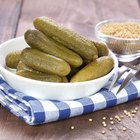
GYRO PHOTOGRAPHY/amanaimagesRF/amana images/Getty Images
The deep flavor of smoked foods make them a delicacy among the gourmet inclined. While they may enjoy the satisfaction of a culinary delight, the long-term health benefits are not necessarily as delightful. The smoking process may actually be harmful, and the advantages and disadvantages need to be weighed.
Definition
What exactly are smoked foods? Foods that have been exposed to smoke from a source, typically wood. Smoking the foods is normally for cooking or preserving. The smoking process is achieved when the wood or other smoke source is heated, causing smoke to rise. The foods sit on top of the smoke and acquire the taste of the smoke. A barbecue is an excellent example. Sounds simple, but it is questionable whether or not it is healthy.
Types
Many different foods are typically smoked to achieve flavor. Most common are meats and fish, but other foods such as cheeses and vegetables are often smoked as well. Some foods are smoked and packaged, such as "deli-style" meats such as sliced turkey and pastrami. Smoked salmon, sometimes known as lox, is also a popular smoked dish. Innovative cooks can also smoke foods in their homes through a barbecue using charcoal, wood chips or propane.
Considerations
There are two, main health considerations when dealing with smoked foods. One is how well the food is cooked, and the other is carcinogenic properties. Smoked foods are often not fully cooked as well as foods that have been cooked on a flame. The FDA has identified certain parasites that are present in raw fish that may still be present in smoked fish. The smoking process also releases harmful carcinogens such as nitrites and nitrates into the foods.
Benefits
The benefits of eating smoked foods include their nutrients and low fat content. Foods that are generally smoked are proteins, and they have all of the benefits of high-protein foods in a form that many people enjoy eating. Additionally, the smoking process is a fat-free form of cooking that not only doesn't require extra fats in sauces and preparation, but actually reduces the fats existing in the foods, as much of it drips out while being smoked.
Solutions
There are ways to enjoy the benefits of smoked foods while reducing the health risks. The National Institute of Health recommends to heat any deli meats to steaming before eating and cooking any cold-smoked fish. The NIH further cautions to control the temperature of a barbecue, as over-heating the meats causes higher development of certain carcinogens. It's also recommended to marinate foods in a vinegar base before heating, which seems to impede the formation of carcinogens.
Related Articles

How to Start a charcoal fire without ...

Advantages & Disadvantages of Dry ...

The Best Way to Cook Kielbasa

The Difference Between Grilled & ...

What Are the Dangers of Cooking With ...

How to Brine Fish Before Cooking It

Processed Food Definition

The Difference Between Grill & Griddle

How to Cook With a Brinkmann Barrel ...

How to Smoke Ribs With a Gas Smoker

How to Cook With a Gas Tank

Liquid Smoke Ingredients

How to Cook on a Charcoal Grill

The Difference Between Grilled and ...

Nutritional Effects of Overcooking

Dimethicone Hazards

The Advantages of Pickling Foods

How to Make Teriyaki Sauce
Do You Drain the Marinade Before ...

How to Smoke a Ham in a Bradley Smoker
References
Resources
Writer Bio
Jordan Saibil began writing professionally in 2010. He pursued a medical degree at Columbia University's College of Physicians and Surgeons as well as a law degree at the Cardozo School of Law. He holds a Bachelor of Science with honors in psychology from McGill University and a health sciences degree from Marianopolis College.
Photo Credits
GYRO PHOTOGRAPHY/amanaimagesRF/amana images/Getty Images